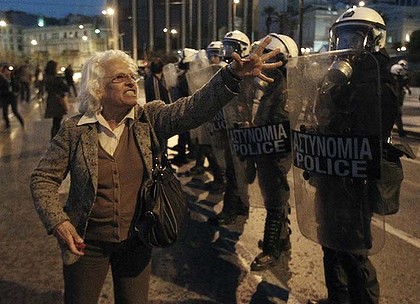
Protesters in Greece have gone again in rebellion in the aftermath of the suicide of a pensioner depressed over the economic crisis. The retiree said that the state was moving toward fascism., a photo by Pan-African News Wire File Photos on Flickr.
September 6, 2012 2:22 pm
Draghi outlines bond buying plan
By Claire Jones in London and Michael Steen in Frankfurt
FInancial Times
Mario Draghi on Thursday outlined plans by the European Central Bank to aggressively expand its bond buying programme to counter financial-market speculation about the break-up of the euro.
The ECB president said the programme, dubbed “outright monetary transactions”, would address “short-term distortions in financial markets”, particularly those caused by speculation of a break-up of the eurozone.
Mr Draghi said the bank could potentially buy an unlimited amount of eurozone sovereign debt with maturities of between one and three years.
As expected, the bank refrained from publishing any formal cap on bond yields that it considers excessive and confirmed that the ECB would not be treated as a preferred creditor in the event of default.
Mr Draghi said not everyone on the governing council backed the new plan. “There was one dissenting view,” he said. Germany’s Bundesbank has publicly voiced its opposition to the bond-buying plan, which the ECB president outlined last month.
Mr Draghi emphasised that any bond purchases by the ECB were conditional on governments signing up to a European Financial Stability Facility or European Stability Mechanism programme, or having already received an EU/ IMF bailout. The liquidity created by the bond purchases would be removed from markets by the ECB through a process known as sterilisation, in which it will sell securities to offset new purchases.
The IMF’s involvement would be sought in designing country-specific conditionality and in monitoring governments’ commitments to the programmes, said Mr Draghi. The ECB president warned that bond buying would stop if governments did not comply with the conditions.
The ECB cut its quarterly economic forecasts. It now expects the eurozone economy to shrink by between 0.2 and 0.6 per cent this year. The midpoint for its 2013 forecast is now for growth of 0.5 per cent, down from the 1 per cent it estimated in June.
Mr Draghi said risks to the economic outlook were “to the downside” as a result of the potential for financial sector problems to spill over to the economy.
The central bank revised its inflation forecasts upwards on the back of an increased likelihood of hikes to indirect taxes.
The bank kept its main refinancing rate on hold at 0.75 per cent. In a short statement, the bank also said it was keeping its deposit facility rate at zero and the marginal lending facility at 1.5 per cent.
Mr Draghi last month sketched the outlines of the proposed sovereign bond-buying programme and the bank has spent the intervening month working out how to implement such purchases and seeking to build consensus.
Earlier, Sweden’s Riksbank cut its main borrowing rate to 1.25 per cent from 1.5 per cent, in a response to the worsening eurozone economy.
The OECD added to the gloomy outlook for the eurozone by sharply cutting its forecasts for the region, and warned the eurozone crisis was hurting global confidence and weakening trade.
No comments:
Post a Comment